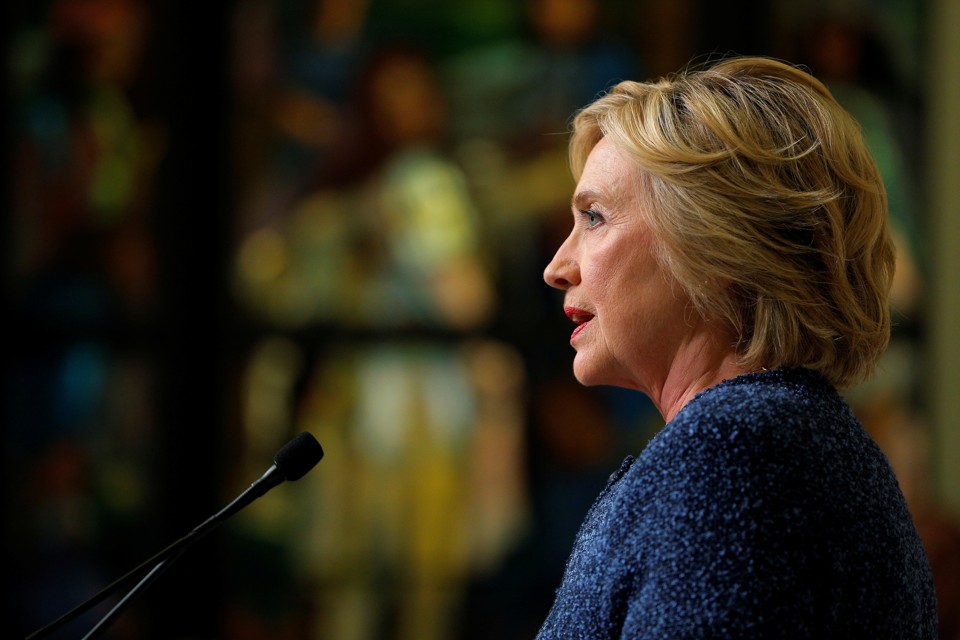How Breitbart Conquered the Media
Political reporters were taken aback by Hillary Clinton’s charge that half of Trump’s supporters are prejudiced. Few bothered to investigate the claim itself.

In Obama’s America, “the white kids now get beat up, with the black kids cheering,” explained Rush Limbaugh. “And of course everybody says the white kid deserved it—he was born a racist, he’s white.” Iowa Republican Representative Steve King charged that Obama has a “default mechanism” that “favors the black person.” Tea Party supporters arrived at rallies charging Obama with endorsing “white slavery.” Now Breitbart purported to have in his hands proof that would prove that it was the NAACP and its allies in the White House who were the real racists.
Breitbart’s “video evidence” was stunningly effective. The NAACP immediately denounced the remarks and the U.S. Department of Agriculture official who’d made them—Shirley Sherrod—was, in short order, forced to submit her resignation via Blackberry. “You’re going to be on Glenn Beck tonight,” she wastold. The remark was revealing. It was Beck who best channeled the Tea Party’s spirit of racial victimization. The president was a man with “a deep-seated hatred of white people,” claimed Beck. “This guy is, I believe, a racist."
Later, when it was revealed that Breitbart had perpetrated a massive deception, when no less than Glenn Beck defended Sherrod, it was easy to think that Andrew Breitbart had, himself, endured a humiliating and disqualifying loss.
Events on Friday threw that thesis into doubt. Hillary Clinton made a claim—half of Donald Trump’s supporters are motivated by some form of bigotry. “The racist, sexist, homophobic, xenophobic, Islamophobic—you name it,” she said. “And unfortunately, there are people like that, and he has lifted them up.” Clinton went on to claim that there is another half—people disappointed in the government and economy who are desperate for change. The second part of this claim received very little attention, simply because much of media could not make its way past the first half. The resultant uproar challenges the idea that Breitbart lost.
Indeed, what Breitbart understood, what his spiritual heir Donald Trump has banked on, what Hillary Clinton’s recent pillorying has clarified, is that white grievance, no matter how ill-founded, can never be humiliating nor disqualifying. On the contrary, it is a right to be respected at every level of American society from the beer-hall to the penthouse to the newsroom.
The media’s criticism of Clinton’s claim has been matched in vehemence only by their allergy to exploring it. “Candidates should not be sociologists,” glibly asserted David Brooks on Meet The Press. I’m not sure why not, but certainly journalists who broadcast their opinions to the nation should have to evincesomething more than a superficial curiosity. It is easy enough to look into Clinton’s claim and verify it or falsify it. The numbers are all around us. And the story need not end there. A curious journalist might ask what those numbers mean, or even push further, and ask what it means that the ranks of the Democratic Party are not totally free of their own deplorables.
Instead what followed was not journalism but, as Jamelle Bouie accurately dubbed it, “theater criticism.” Fournier and Blake’s revulsion at the thought that some 20 percent of the country, in some fashion, fit into that basket is illustrative. Neither made any apparent attempt to investigate the claim. No polling data appears in either piece and no reasons are given for why the estimate is untrue. It simply can’t be true—even if the data says that it actually is.
This is what Andrew Breitbart, and his progeny, ultimately understood. What Shirley Sherrod did or did not do really didn’t matter. White racial grievance enjoys automatic credibility, and even when disproven, it is never disqualifying of its bearers. It is very difficult to imagine, for instance, a 9/11 truther, who happened to be black, becoming even a governor. And yet we live in an era in which the country’s leading birther might well be president. This fact certainly horrifies some of the same journalists who attacked Clinton this weekend. But what they have yet to come to grips with is that Donald Trump is a democratic phenomenon, and that there are actual people—not trolls under a bridge—whom he, and his prejudices against Latinos, Muslims, and blacks, represent.
I do not believe that journalists are so powerful as to disabuse this group of their beliefs. But there is something to be said for not contributing to an opportunistic ignorance. For much of this campaign journalists have attacked Hillary Clinton for being evasive and avoiding hard questioning from their ranks. And then the second Clinton is forthright and says something revealing, she is attacked—not for the substance of what she’s said—but simply for having said it. This hypocrisy carries a chilling implicit message: Lie to me. Lie to the country. Lie to everyone. This weekend was not just another misanalysis, it was a shocking betrayal of the journalistic mission which should urge the revelation of truth as opposed to the propagation of hot takes, Washington jargon, and politics-speak.
The safe space for the act of being white endures today. This weekend, the media, an ostensibly great American institution, saw it challenged and—not for the first time—organized to preserve it. For speaking a truth, backed up by data, Clinton was accused of promoting bigotry. No. The true crime was endangering white consciousness. So it was when the president asserted that it was stupid to arrest a man for breaking into his own home. So it was when the president said that if he had a son, he would look like Trayvon Martin. And so it is when reformers suggest police not stop citizens on so flimsy a pretext as furtive movements. The need to be white is a sensitive matter—one which our institutions are inexorably and mindlessly bound to protect.



No comments:
Post a Comment